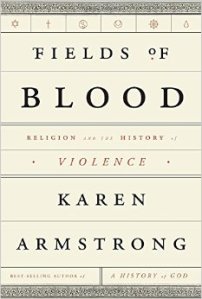 Karen Armstrong is an extremely well-known and prolific writer on religious matters. This is a great book, and one that all should read.
Karen Armstrong is an extremely well-known and prolific writer on religious matters. This is a great book, and one that all should read.
If you talk to any atheist for more than a minute or two you will surely hear the refrain: “more have died in the cause of religion than for any other reason. Religion is violent, intolerant, and a destroyer of consensus.”
And on the surface, one can point to the Middle East, the “troubles” of Ireland, the active palpable hatred between Right wing evangelicals in this country and virtually anyone else. All these suggest that the remark is correct.
But many of us suspected it was otherwise.
Karen Armstrong makes that case.
Armed with prodigious amounts of research and statistics, she shows very strongly that religion is indeed not the culprit, although it no doubt has it’s violent people who lay claim to being “believers” while at the same time, acting in a matter that in no way is in agreement with the tenets of the faith they espouse.
Blaming it on religion is the simplistic, non-thinking response. The causation goes a good deal deeper, and Ms. Armstrong takes us there by moving back through history. Agrarianism changed the balance. It produced surpluses, the farmer, in return for “safety” gave over part of his harvest to one or some who did no work but promised to “protect” them. Inevitably this led to coercion, threats and violence as not everyone wanted such “protection.” Religion is “used” by such elites to solidify their control. It is in essence “God’s will” that you give me part of yours and I promise to protect you. Whether that protection was ever forthcoming doesn’t matter.
When we approach the new notion of the “nation state” a similar process ensues. One must be connected to the new nation, it must become important. A shared history is promoted, a general “rightness” is assigned to colonialism. Empty lands (not productive in the way the invader desires), are unnatural and thus available to the strongest. The nation becomes the revered “god” to be protected at all costs. It takes on that religious fervor found so necessary to get others to do what they would not otherwise do.
All the so-called religious wars end up reflecting secular desires and needs of the state or those who control such states. The Crusades for instance, were deemed religious wars, yet Christians routinely killed civilians, pillaged even Christians but saved their special violence for Jews. At one time Muslims were considered the protectors of Jews in the Middle East. Can anyone believe that today?
Religious wars are almost always fought for land or power. The use religious terminology because people respond by offering their lives when they find “meaning” in their actions. Secular actions are imbued with religious significance for this purpose.
Moreover the violence incumbent in power is often tamed by religious people and institutions. Groups like the Muslim Brotherhood has done on balance probably much more good in Egyptian society than the bad they are accused of. They have struggled to provide health care, education, and a host of other forms of assistance to those who have been the victims of the state’s power.
The US and Western Europe bears a huge fault in much of what has gone wrong in India, Pakistan, and throughout the Middle East, from their arbitrary and utterly self-serving “boundary lines” denoting “countries” that no longer resemble ancient regimes nor ethnic groups to their insertion of puppet demagogues through the region. These dictators and their small band of elites reap the rewards while the general populations remain and often worsen in poverty.
Studies done of Jihadi youth show that most joined not for religion, and in fact many of them are fairly secularists or at least have not been serious in their faith, but rather to strike back at those who have demeaned, humiliated, and economically starved their brothers and sisters for decades in the name of greed.
The French Revolution a decidedly secular affair proceeded to the Reign of Terror, all without religion as a motivation. This will not stop the detractors of course, the New Atheists who thrive on the theory that religion is at its heart violent. And it falls against Steven Pinker’s work that suggests that the level of violence in the world has steadily fallen since the beginning of recorded time.
There is room for argument here no doubt. Ms. Armstrong makes it clear that there are always myriads of reasons and it is impossible and wrong to limit oneself to one or another response only. But I think she makes a good point, and we should recognize that indeed humans are more than crafty enough to use religion for purposes other than those intended.
A valuable read for those who like to examine the big questions along long time lines. As always her research is the best, and she reads easily.
